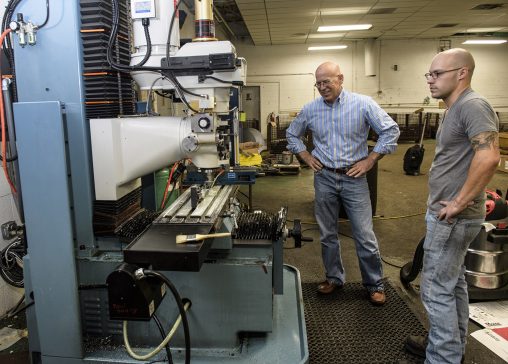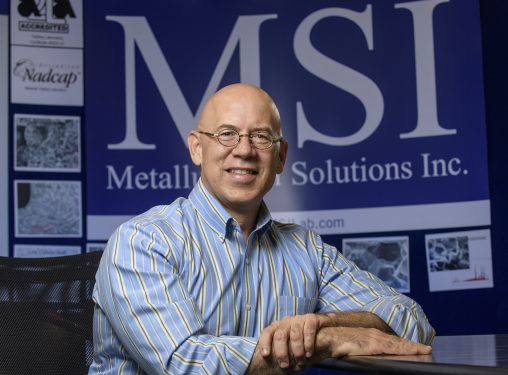
Brian Joyce, Metallurgical Solutions president and Wright State alumnus, left, and Teddy Porumb, an employee and Wright State engineering student. (Photos by Erin Pence)
Employees call it the “break room” because it’s where they break things. Namely, they stress metal parts to the breaking point so they can be validated for use in cars, airplanes, missiles, operating tables and other important applications.
It all happens under the roof of Metallurgical Solutions, Inc., a metal-testing lab in Middletown headed by Wright State University alumnus Brian Joyce. He opened the business in 2002 and has since employed many Wright State students and graduates.
A stroll through the sprawling laboratory building reveals an array of muscular tensile machines, which test metal components by pulling them apart. The machines power up, hissing and whirring before snapping metal parts with a loud crack.
Elsewhere in the lab are a lathe, a punch press and corrosion cabinets, which test metal parts with a salt fog environment in accordance with American Society of Testing and Materials (ASTM). An aluminum motor housing to be tested lies in pieces on the floor. Large blue trash bins brim with metal shavings. Other rooms house microscopes and chemical testing equipment.
In addition to chemical analysis and mechanical and corrosion testing, the lab does microstructure evaluation, coating analysis, scanning electron microscopy and consulting. It is considered one of the better failure-analysis labs in the state and perhaps the country.
“We’re a small company with big shoulders, supporting large companies and important issues,” said Joyce. “Expedited routine testing for automotive suppliers is provided on a daily basis.”

Brian Joyce was a commissioned officer and flight test engineer in the Air Force before he enrolled at Wright State, where he earned a Ph.D. in materials engineering in 2004.
Joyce grew up in Kenosha, Wisconsin. After graduating high school, he joined the Air Force and worked in accounting and finance before being accepted into an aeronautical and astronautical engineering program. He earned his bachelor’s degree in engineering from Purdue University in 1988.
Then Joyce was commissioned as an officer in the Air Force and worked as a flight test engineer at Edwards Air Force Base in California, where he witnessed landings of the space shuttle and met record-setting test pilot Chuck Yeager.
F-117 Stealth Fighters would sometime fly over Joyce’s home.
“I saw a lot of things before anyone else knew they existed,” he said.
Joyce later moved to Ohio and in 1992 earned his master’s degree in finance from the Air Force Institute of Technology at Wright-Patterson Air Force Base. He worked for a few years with a defense contractor and then enrolled in Wright State’s College of Engineering and Computer Science, where he discovered materials engineering.
“It was like a second language. It just clicked,” he said.
In 2000, Joyce took a job managing a metals testing lab in Dayton, where he grew the company’s annual sales from $300,000 to $1 million. He earned his Ph.D. in materials engineering in 2004, studying thermo-mechanical processing of titanium.
“At Wright State, it’s a lot more personal. I liked that,” he said. “If you had a problem or a question, the professors were approachable. I learned a lot.”
In 2002, Joyce opened his business in Middletown in a tiny, 1,500-square-foot building with two employees and four testing machines. Today, he has six employees — including two Wright State graduates — in a sprawling, 15,000-square-foot building that houses dozens of machines. Annual sales for the company are about $1 million.
The company is certified to do testing for the automotive and aerospace industries, including General Electric and its suppliers.
“Dr. Joyce is one of our early Ph.D. graduates who has made quite a name for himself and his business,” said Joseph Slater, chair of Wright State’s Department of Mechanical and Materials Engineering. “I think he is a great example of alumni representing WSU.”
Despite his company’s success, the 55-year-old Joyce worries that the metal-testing industry may soon face a shortage of engineers.
“Not enough people are going into the metals side,” he said. “And there is going to be a vacuum because a lot of the old guys are retiring.”
Wright State became an independent institution in 1967 and has grown into an innovative leader in the Dayton region and beyond, capturing the spirit of the university’s namesakes, Wilbur and Orville Wright, who invented the world’s first successful airplane from their Dayton bicycle shop. It celebrates its 50th anniversary as an independent public university in 2017.

 Wright State baseball to take on Dayton Flyers at Day Air Ballpark April 15
Wright State baseball to take on Dayton Flyers at Day Air Ballpark April 15  Wright State joins selective U.S. Space Command Academic Engagement Enterprise
Wright State joins selective U.S. Space Command Academic Engagement Enterprise  Glowing grad
Glowing grad  Wright State’s Homecoming Week features block party-inspired events Feb. 4–7 on the Dayton Campus
Wright State’s Homecoming Week features block party-inspired events Feb. 4–7 on the Dayton Campus  Wright State music professor honored with Ohio’s top music education service award
Wright State music professor honored with Ohio’s top music education service award 